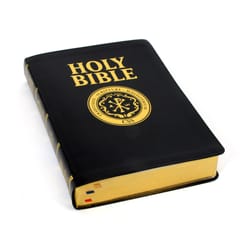that they have the Word of God,
that we received it from them,
and that without them
we should have no knowledge of it at all."
~ Martin Luther
The Canon of Scripture [Ecumenical]
To understand Bible, one must understand its nature, pope says
Let the Bible be “entrusted” to the faithful
But Seriously — Who Holds the Bible’s Copyright?
Ignorance of Scripture is Ignorance of Christ
Apostolic Authority and the Selection of the Gospels (Ecumenical)
The Bible - 73 or 66 Books? (Ecumenical Thread)
How Rediscovering the “Plot” of Sacred Scripture is Essential to Evangelization
The Word of God is a Person Not Merely a Text
Are Catholics into the Bible?
Are the Gospels Historical?
What is Biblical Prophecy? What Biblical Prophecy is NOT, and What It Really IS
Biblical Illiteracy and Bible Babel
The Pilgrims' Regress - The Geneva Bible And The "Apocrypha"
The "Inconvenient Tale" of the Original King James Bible
The Bible - an absolutely amazing book
Christian Scriptures, Jewish Commentary
Essays for Lent: The Canon of Scripture
Essays for Lent: The Bible
1500 year-old ‘ Syriac ‘ Bible found in Ankara, Turkey
How we should read the Bible
St. Jerome and the Vulgate (completing the FIRST Bible in the year 404) [Catholic Caucus]
In Bible Times
Deuterocanonical References in the New Testament
Translations Before the King James: - The KJV Translators Speak!
EWTN Live - March 23 - A Journey Through the Bible
"Our Father's Plan" - EWTN series with Dr. Scott Hahn and Jeff Cavins on the Bible timeline
The Daunting Journey From Faith to Faith [Anglicanism to Catholicism]
Reflections on the Soon to Be Released New American Bible (Revised Edition)[Catholic Caucus]
New American Bible changes some words such as "holocaust"
Is the Bible the Only Revelation from God? (Catholic / Orthodox Caucus)
History of the Bible (caution: long)
Catholic and Protestant Bibles
THE CATHOLIC CHURCH: ON READING THE BIBLE [Catholic Caucus]
Because I Love the Bible
Where Is That Taught in the Bible?
When Was the Bible Really Written?
Three Reasons for Teaching the Bible [St. Thomas Aquinas]
The Smiting Is Still Implied (God of the OT vs the NT)
Where Is That Taught in the Bible?
Friday Fast Fact: The Bible in English
Bible Reading is Central in Conversions to Catholicism in Shangai, Reports Organization
Verses (in Scripture) I Never Saw
5 Myths about 7 Books
Lectionary Statistics - How much of the Bible is included in the Lectionary for Mass? (Popquiz!)
Pope calls Catholics to daily meditation on the Bible
What Are the "Apocrypha?"
The Accuracy of Scripture
US Conference of Catholic Bishops recommendations for Bible study
CNA unveils resource to help Catholics understand the Scriptures
The Dos and Don’ts of Reading the Bible [Ecumenical]
Pope to lead marathon Bible reading on Italian TV
The Complete Bible: Why Catholics Have Seven More Books [Ecumenical]
Beginning Catholic: Books of the Catholic Bible: The Complete Scriptures [Ecumenical]
Beginning Catholic: When Was The Bible Written? [Ecumenical]
The Complete Bible: Why Catholics Have Seven More Books [Ecumenical]
U.S. among most Bible-literate nations: poll
Bible Lovers Not Defined by Denomination, Politics
Dei Verbum (Catholics and the Bible)
Vatican Offers Rich Online Source of Bible Commentary
Clergy Congregation Takes Bible Online
Knowing Mary Through the Bible: Mary's Last Words
A Bible Teaser For You... (for everyone :-)
Knowing Mary Through the Bible: New Wine, New Eve
Return of Devil's Bible to Prague draws crowds
Doctrinal Concordance of the Bible [What Catholics Believe from the Bible] Catholic Caucus
Should We Take the Bible Literally or Figuratively?
Glimpsing Words, Practices, or Beliefs Unique to Catholicism [Bible Trivia]
Catholic and Protestant Bibles: What is the Difference?
Church and the Bible(Caatholic Caucus)
Pope Urges Prayerful Reading of Bible
Catholic Caucus: It's the Church's Bible
How Tradition Gave Us the Bible
The Church or the Bible
